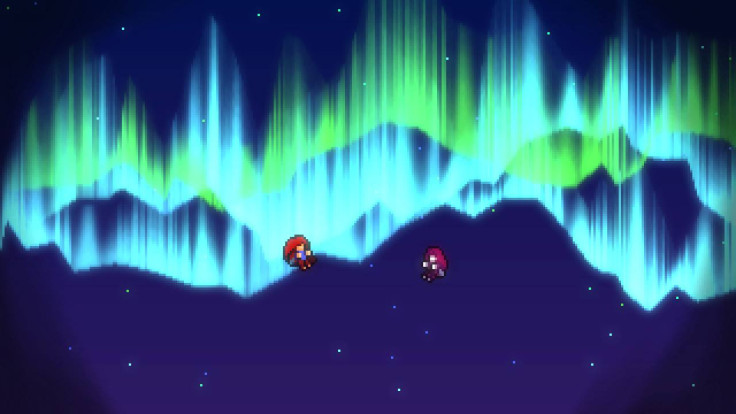Celeste review: A challenging platformer about mental health and perseverance
Every so often the right game comes along at the right time.

Every so often the right game comes along at the right time. It might be the right time for the people that made it, a genre in need of a shake-up, the industry as a whole or the right time for the person playing it.
Celeste is a game about anxiety, depression and perseverance from TowerFall creator Matt Thorson and his small team at Matt Makes Games. Players are cast as Madeline, a young woman charged with doubt who sets out to climb Celeste Mountain.
It's no ordinary mountain however. Strange happenings draw out Madeline's insecurities, giving them tangible form with the express desire of making her journey as arduous as possible.
Celeste is a platformer that, in the fine tradition of the genre, is based around a simple set of moves. Madeline is able to jump and double jump, phasing a short distance ahead of her in any direction.
She can also cling to certain surfaces and climb them for a limited time before losing grip and sliding down. These abilities are simple and easy to grasp, but are put to use in a variety of fiendish ways.
There are no regularly-occurring enemies in the game - no Goombas or Koopa Troopas - just obstacles in the way and paths to figure out.
There are deadly surfaces to avoid, others that become overgrown with a poisonous substance after being touched. There are blocks that move at your command, others that shoot in set directions, and gelatinous blobs that propel you in the direction you phase.
New elements are added throughout, each clearly explained and introduced gently as to not overwhelm players. Celeste might not have a kind difficulty curve, but it does have a steady and consistent one. So it might not ease players in, but they do know where they stand.
It's a tough game, but not a punishing one. Its challenges are presented piecemeal, largely a screen at a time. What's more, the game encourages and supports those playing it, making them aware that this journey won't be easy but assuring them its hurdles are surmountable.
A counter at the end of each lengthy level reveals the dozens, if not hundreds of deaths you've suffered. It's not a tally of how bad you were however. Rather, it's a reminder that no matter how many times you might have failed, you made it in the end.

Tough games have almost become their own genre, with the series most famed for its challenge becoming the measuring stick of sorts, and a series all too easy to reference in reviews like these...
Yeah, I'm about to reference it. Sorry.
There are challenging games that are foremost about a player's struggle and those more about the success that follows. The journey and the destination are both part of the story of course, so the difference I'm talking about depends on what a developer chooses to focus to best frame the tale it is trying to tell.
Repeated failure and feeling like you're bashing your head against a wall might lend itself to the creation of oppressive and hopeless settings. Settings punctuated by the aches and pains of a constant struggle, as in FromSoftware's Souls series.
In Celeste similar feelings represent Madeline's inner conflict, but always framed in a way that emphasises her goal of succeeding, of healing, even if it's comes one small win at a time. There's an optimism to Celeste evident in its protagonist and her very decision to climb the mountain.
Madeline welcomes the challenge, she believes it will help her and while doubts still swirl in her mind, there's a part of her - sometimes defiant, sometimes drowned out - that believes she can reach the seemingly impossible summit.
Deftly written and well-observed dialogue provides some powerful moments, but for the most part Madeline's story is one players are linked to through play.
Understanding and treating feelings of depression, anxiety and self-loathing isn't about sudden, massive changes. It's an incremental process. Every step forward, every platforming puzzle you overcome is valuable, and they add up. You might stumble along the way, but every small push towards your goal comes with the knowledge of how to return there.
As you begin to master Celeste its puzzles appear less daunting and your confidence grows. There will be areas that take 30 or 40 attempts to clear, but they might be followed by one you sail through flawlessly first time. That's an incredible feeling.
When you're stringing together maneuvers Madeline moves with grace and purpose, and the richness of Celeste's mechanics come to the fore, working in tandem with the beautiful scenery of one of recent memory's most gorgeous pixel-art games.
Celeste is a simple story, powerfully told. It might not have anything revelatory to say about mental health, but it tackles the subject head on with confidence and understanding. The mountain as a metaphor isn't exactly a new concept, but Thronson tells his story with charming conviction, aided by perfectly pitched gameplay that strengthens the connection between players and Madeline.
Celeste is an beautiful, optimistic game about how triumph can outweigh any number of failures . It's about reconciling your pain, frustrations and defeats. It's about getting better, in every sense.



















